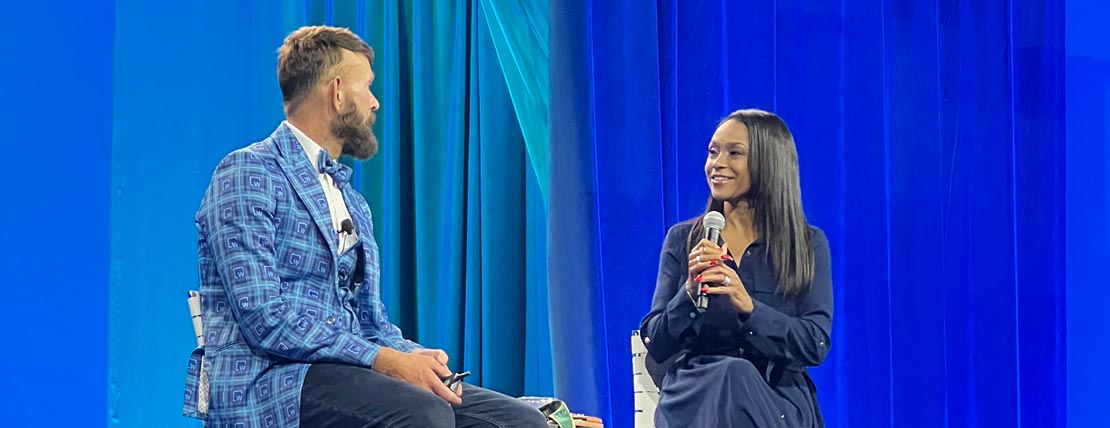- Recognize the impact you make. Effective leaders make a positive impact by helping those around them “dream big and plant seeds.”
- Work is an individual and team sport. Leaders need to develop talented individuals who can collectively achieve great things.
- Know when to lead and when to step back. Leaders should create an environment where individuals can step forward and share their voice and skills.
Dominique Dawes’ experiences with coaches, trainers and leaders started when she was 6 years old and ramped up during her 10 years as a member of the U.S. National Gymnastics Team. She saw, felt and internalized what positively impacted individual and collective performance … and what negatively impacted it.
During the closing keynote session at WorldatWork’s Total Rewards’24 conference in Cincinnati, Dawes explained how those lessons learned as a four-time Olympic medalist (including a gold in the team competition at the 1996 Games) have translated into a post-competition career as:
- The owner of three gymnastics and ninja sports academies, with more than 100 employees and more than 1,000 participant customers
- A limited partner of the National Football League’s Atlanta Falcons
- A minority owner of the National Women’s Soccer League’s Washington Spirit
- An advisory board member of Sesame Workshop’s “Healthy Habits for Life” program
- The executive producer of a Peacock Network docu-series (“Golden”).
Dawes told the audience that her role as a business leader — but particularly as a people leader — is to “make an impact on others’ lives” by helping those around her “dream big and plant seeds.”
She confided that “there were a lot of people around [her] that planted some really bad seeds.” There were past leaders who controlled and mistreated, and generated a culture of fear and negativity. When you are around those kinds of people, “that creates a lot of misery,” she said.
Today, Dawes said her various roles serve to provide others with a healthy personal and professional lifestyle. Her guidance to TR’24 attendees — and all total rewards leaders — includes:
1) Understand the individual nature of the working world.
“Don’t let anyone fool you: Gymnastics is so much an individual sport,” Dawes said. “There are only a handful of times that you actually get to work together as a team.”
As such, individuals need the space to hone their craft — their special skills. As such, allow them to showcase what makes them unique, but also present ways to continuously learn additional tricks and routines as a springboard to new opportunities.
2) Position those individuals into an effective, mission-driven team.
Dawes acknowledged that most everyone has an ego — gymnasts, perhaps, more than others. While it’s OK for people to have a strong self-view, leaders need to know when and how to reign that in.
“I think the 1996 [U.S. women’s Olympic gymnastics] team was our best team because we made the collective decision to check our egos at the door,” she said.
Prior to those Games, team members had their eyes on individual medals, endorsement deals and speaking engagements. “We decided, though, to [put the] focus on making history for our country, and that’s why I think we were able to make it happen and bring home [first place in the team competition].”
“When you are working with a team, I think you need to appreciate and respect and listen to those that are on the team,” Dawes said. “You need to find a way to work together and not against one another. When it is all about your ego, there is going to be a lot of clashing, especially if people are not on board and doing things their own way.”
3) Be personally involved but know when to step back.
As the owner of a gymnastics and ninja sports company, Dawes said she relishes personal involvement in crafting the workforce team. As such, she said she reviews every resume and interviews every job candidate.
“If I fail at hiring the right person with the right character to be a part of my academy, then I have failed as a leader,” Dawes shared.
But she also said she has learned the importance of letting her appointed leaders and workers do what they do best.
“While I can bring in people who believe in our philosophy and believe in our mission, I then have to trust,” she said. “I need to remember that everyone’s voice matters and that I can’t do this alone. I need to be open to others’ opinions, even if they are different than my own. I have learned to delegate. I have learned to let go. I can bring in the right talent and make sure they are properly trained, but then I need to step back. I allow those I’ve hired to be leaders to be leaders.”
4) Understand the true meaning of success.
Dawes is an athletic legend who earned the nickname “Awesome Dawesome.” She has a showcase of medals and accolades, and even a life-sized bronze statue in her hometown of Silver Spring, Maryland.
She remarked that, looking back on her career, while individual and team honors are quite nice, all that glitters is not necessarily gold. As such, leaders should strive for something a bit more meaningful.
“Success is truly about the relationships [and the people] that you build,” she said.
Dawes said there are people — at work and outside of work — who need “someone who helps them believe in themselves a little more.” She challenged TR leaders to be that “someone.”
Editor’s Note: Additional Content
For more information and resources related to this article, see the pages below, which offer quick access to all WorldatWork content on these topics:








